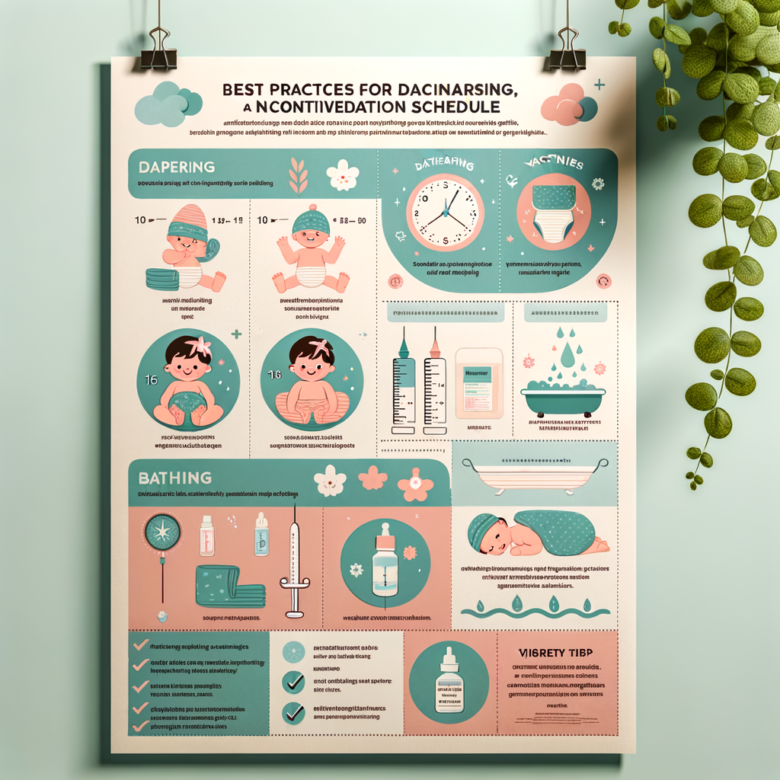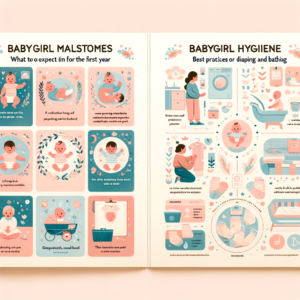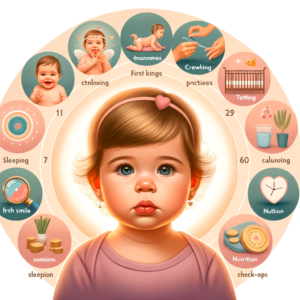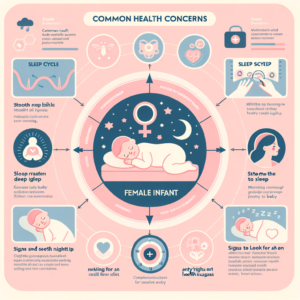Vaccinations are a crucial part of your babygirl’s health care, protecting her from serious and potentially life-threatening diseases. This comprehensive guide will walk you through the recommended vaccination schedule for the first few years of your babygirl’s life, explain the importance of each vaccine, and address common concerns.
The Importance of Vaccinations
Vaccines work by stimulating your babygirl’s immune system to produce antibodies against specific diseases. This prepares her body to fight off these diseases if she’s ever exposed to them. Vaccinations not only protect your child but also contribute to community immunity, helping to protect those who can’t be vaccinated.
Recommended Vaccination Schedule
The following schedule is based on recommendations from the Centers for Disease Control and Prevention (CDC) in the United States. Always consult with your pediatrician, as schedules may vary slightly depending on your location and your babygirl’s specific health needs.
Birth
- Hepatitis B (HepB) (1st dose)
2 Months
- Rotavirus (RV) (1st dose)
- Diphtheria, Tetanus, Pertussis (DTaP) (1st dose)
- Haemophilus influenzae type b (Hib) (1st dose)
- Pneumococcal conjugate (PCV13) (1st dose)
- Polio (IPV) (1st dose)
4 Months
- Rotavirus (RV) (2nd dose)
- Diphtheria, Tetanus, Pertussis (DTaP) (2nd dose)
- Haemophilus influenzae type b (Hib) (2nd dose)
- Pneumococcal conjugate (PCV13) (2nd dose)
- Polio (IPV) (2nd dose)
6 Months
- Hepatitis B (HepB) (2nd dose)
- Rotavirus (RV) (3rd dose if needed)
- Diphtheria, Tetanus, Pertussis (DTaP) (3rd dose)
- Haemophilus influenzae type b (Hib) (3rd dose)
- Pneumococcal conjugate (PCV13) (3rd dose)
- Polio (IPV) (3rd dose)
- Influenza (Flu) (annually)
12 Months
- Measles, Mumps, Rubella (MMR) (1st dose)
- Varicella (Chickenpox) (1st dose)
- Hepatitis A (HepA) (1st dose)
15 Months
- Haemophilus influenzae type b (Hib) (4th dose)
- Pneumococcal conjugate (PCV13) (4th dose)
18 Months
- Diphtheria, Tetanus, Pertussis (DTaP) (4th dose)
- Hepatitis A (HepA) (2nd dose)
4-6 Years
- Diphtheria, Tetanus, Pertussis (DTaP) (5th dose)
- Polio (IPV) (4th dose)
- Measles, Mumps, Rubella (MMR) (2nd dose)
- Varicella (Chickenpox) (2nd dose)
Understanding Each Vaccine
Hepatitis B (HepB)
Protects against a serious liver disease that can lead to liver damage and cancer.
Rotavirus (RV)
Prevents severe diarrhea in infants and young children.
Diphtheria, Tetanus, Pertussis (DTaP)
Protects against three serious bacterial diseases:
| – Diphtheria: A serious throat infection |
|---|
- Tetanus: Causes painful muscle stiffening
- Pertussis: Also known as whooping cough
Haemophilus influenzae type b (Hib)
Prevents a bacteria that can cause meningitis and other serious infections.
Pneumococcal conjugate (PCV13)
Protects against pneumococcal disease, which can cause ear infections, pneumonia, and meningitis.
Polio (IPV)
Prevents poliomyelitis, a disabling and life-threatening disease.
Influenza (Flu)
Annual vaccine to protect against seasonal flu strains.
Measles, Mumps, Rubella (MMR)
Protects against three highly contagious viral diseases.
Varicella (Chickenpox)
Prevents chickenpox, which can be severe in infants and adults.
Hepatitis A (HepA)
Protects against a liver disease that can cause severe illness.
Preparing for Vaccination Appointments
- Bring your babygirl’s vaccination record to each appointment
- Dress your baby in easily removable clothing
- Bring a favorite toy or blanket for comfort
- Be prepared with questions for your pediatrician
Managing Vaccination Side Effects
Most side effects are mild and may include:
| – Soreness at the injection site |
|---|
- Low-grade fever
- Fussiness
To manage these:
| – Use a cool, damp cloth on the injection site |
|---|
- Give acetaminophen if recommended by your doctor
- Offer extra cuddles and comfort
Frequently Asked Questions
Q: Are vaccines safe? A: Yes, vaccines undergo rigorous testing and are continuously monitored for safety. The benefits far outweigh the risks.
Q: Can my babygirl receive multiple vaccines at once? A: Yes, it’s safe and effective to receive multiple vaccines in one visit.
Q: What if we miss a scheduled vaccine? A: Talk to your pediatrician about catch-up schedules. It’s never too late to get back on track.
Q: Do vaccines cause autism? A: No, numerous studies have shown no link between vaccines and autism.
Q: Can I delay or spread out my babygirl’s vaccines? A: It’s best to follow the recommended schedule, but discuss any concerns with your pediatrician.
Conclusion
Vaccinations are one of the most important ways to protect your babygirl’s health. By following the recommended schedule, you’re giving her the best chance at a healthy start in life. Remember, each vaccine prevents serious diseases that can cause severe illness, disability, and even death.
While it can be difficult to see your babygirl receive shots, remember that the momentary discomfort is protecting her from much more serious illnesses. If you have any questions or concerns about vaccinations, always discuss them with your pediatrician. They can provide you with the most up-to-date and accurate information to help you make informed decisions about your babygirl’s health.
Stay informed, follow the recommended schedule, and give your babygirl the gift of protection against preventable diseases. Your diligence now will contribute to a healthier future for your child and your community.



